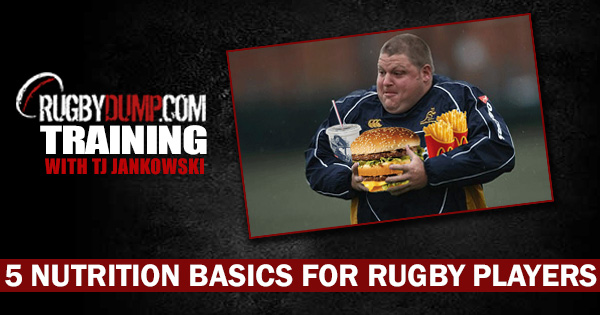
To get the best out of yourself as a rugby player, you already know that you need to pay attention to diet. But what should you eat? Today Rugbydump Academy coach TJ Jankowski takes you through the best ways to fuel your body for rugby.
It’s easy to find out some nutrition guidelines on the internet, right? I mean a little bit of digging and you can find tonnes of advice on what exactly you should be putting in your gob. The problem with this advice is that it can get confusing.
Are you supposed to eat like a caveman? Cutting out the carbs is important if you want to look good right? Maybe you heard somewhere that sweet potato was the magic food that’s going to make you the ultimate athlete… or was that coconut oil?!
Maybe you’ve even gone as far as finding a top athlete’s meal plan and it looks something like this.
Meal 1: Eggs and oats
Meal 2: Chicken and salad
Meal 3: Protein Shake
Meal 4: Tuna and Rice
Meal 5: Protein Shake
Meal 6: Steak and Potatoes.
Some of this advice is all well and good, but it has one major flaw – it all lacks context.
You see, everyone’s different, they have different goals, different bodies and different minds.
These differences mean that one-size-fits-all eating plans and “eat this food” guidelines are a bit crappy when it comes to rugby players. We need to make the diet individual.
So whilst we cannot get too specific for you right now, there are some basics that we can give that will apply to (and help) every single rugby player
1. EAT ENOUGH TO PERFORM
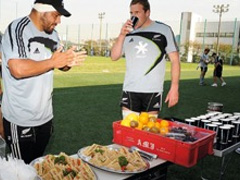
As a rugby player your number 1 goal should be to perform better. Whether that’s on the pitch, training field or in the gym, you need to be at your best.
Performing at your best in training is a hugely important factor of getting better.
The best way to ensure that your fuelled to perform is by making sure you have adequate carbohydrate intake. Really you’ll need these both before and after training, this ensure that not only will you have the energy to train, but you’ll also give yourself the best chance of recovering fast so that you can train hard again.
This means that even if you’re trying to lose fat, you still need to be eating carbs, if you can’t train hard then there’s no point in losing fat in the first place – you won’t be a better rugby player.
Don’t be scared of carbohydrates – as an athlete they’re incredibly important for you to get results.
2. BUT MAKE SURE YOU’RE NOT EATING TOO MUCH
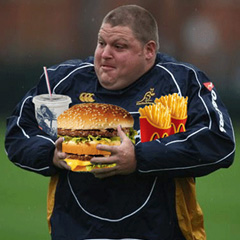
OK yeah, this is maybe the complete opposite of point 1, but it’s just as important.
You see, many rugby players will be made aware of point 1, and use that as an excuse to just eat way too much low-quality food. Yes, you need to get lots of food in, but don’t order a Domino’s and justify it by saying “I need the carbs to recover… I’m an athlete bro”.
When it comes to this it’s important to be aware that healthy fats like nuts are good for you, but gorging them by the pile is going to make it hard to lose fat.
Whilst we’re on the subject of eating too much, you need to be aware that although getting optimal protein in is important, any more than that is a waste. A good number you should be aiming for is around 2 grams of protein per kilo of bodyweight.
Shooting for way more than that is simply unnecessary. A lot of guys mess this up, thinking that if more protein is good, then even more protein is better! It’s not the case, once you have enough protein, then your focus should be on the carbs that help you recover.
These two points are kinda conflicting I know, so I’ll simplify it.
If you’re struggling to lose a bit of fat, make sure your diet isn’t heavy on the fats and eat slightly less. If you’re struggling to gain muscle, make sure that you’re eating enough carbs and consistently getting stronger.
This leads us into the next point.
3. YOU SHOULD KNOW EXACTLY WHAT YOU’RE EATING
When guys tell me that they need help with nutrition because they’re struggling to make progress. I always ask the same question.
“What are you eating at the moment?”
This stumps a lot of them, they don’t even really know what they’re eating on a day-to-day basis. There’s no consistency and a lot of mindless eating.
How can you improve your diet if you don’t know what you’re eating in the first place? You can’t. Try keeping a food diary (I use MyFitnessPal) for a week, then making the adjustments that you see.
This process will make you so much more aware of what you’re eating, and for some of you who haven’t used it before… you’re in for a bit of a surprise.
Realising how many calories are in certain foods is critical if you are to make progress. Take peanut butter for example, a typical serving will give you close to 200 calories, with lots of carbs, protein and fat to boot. This will only work well if you know what you’re doing
Another thing you may notice when you start tracking is your eating habits – those who are overweight may pick up some unconscious snacking that you can cut out and those that aren’t gaining the muscle they’d like may discover long periods of time without lots of food.
4. DON’T WORRY TOO MUCH ABOUT THE LITTLE THINGS
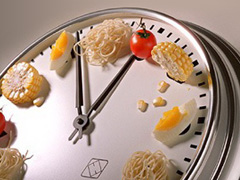
This is another issue that comes up a lot with guys because of the information overload in the fitness industry.
“Breakfast is the most important meal of the day”
“You need to eat often to keep the metabolism going”
“You need to consume a shake straight after the gym”
None of which are necessarily true. It all goes back to the opening bit where we noted context.
Now there has been a tonne of research on food timing and it’s effects, and there definitely is one important factor that food timing has on results.
- Adherence – how well you stick to the diet.
Basically you need to find what works for YOU.
Some lads can’t stomach huge meals, so they need to eat smaller meals.
Others, like myself, love scoffing down a huge platter of goodness, ideally with a shovel.
So eating fewer meals, with a big meal after training is a better way of eating.
Another important point on this subject – you need to figure out what is the best time for you to eat before training for you to train the best. Again, this is individual, and is also where that food diary helps, some lads like to eat an hour or less before they train to get the best out of themselves, others have problems if they eat less than 3 hours before a training session.
The same thing goes for post-workout, you don’t necessarily need to be chugging a protein shake the second you finish. Find a time within around an hour or two post-training that you can get in some quality protein and carbohydrates and go with that.
Just remember to keep in mind point 1, 2 and 3 earlier, these aren’t bonus meals, they are part of your daily intake and should be treated as such.
To summarise, don’t overthink this stuff – just see what works for you.
5. DON’T WASTE YOUR MONEY ON CRAPPY SUPPLEMENTS
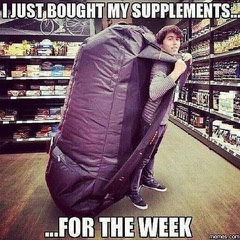
I am taking two supplements at the moment – fish oil and a protein powder. That’s it.
Wind back to when I was at University and I had a huge cupboard full of different powders and tablets, among them were words that I can’t pronounce and a tablet formula known as “Horny Goat Weed”… seriously!
Those that are at Uni know of the money struggles that go on without having to waste a half their loan on supplements. This was stupid.
So I’ve been there. I also remember that I basically wouldn’t bother going to the gym unless I had a protein shake for afterwards! This is the most backwards thinking ever. The results come from the hard work, not the supplements.
The thing is, yes supplements can make a difference, but it’s about 5% of a difference for about 60% extra effort and cost. Don’t fall into the trap that the marketers will have you believe that it’s all down to their magic formula. The real thing that’s going to get you to your goals is you and your hard work!
Clearly some supplements will have their place, but only once your diet and training is completely on point. Don’t waste your energy and thoughts trying to find some great supplements. Focus on the most important things first
Your money is much better spent on quality programming and coaching!!
If you’d really like to dial in your nutrition to get the best out of your training, we just published a 3-part webinar all about how to do that in the Rugbydump Academy, taking someone who knows nothing about nutrition through the process to be able to set their own meal plans to produce amazing, sustainable results.
About TJ JankowskiTJ Jankowski is a former international rugby player for Poland rugby, who achieved their highest world ranking of 23 whilst he was part of the team. It was this reward from hard work that led him to become a coach and help other achieve greater success than he could. TJ now works as an expert Personal Trainer in the middle east, coaching heavy lifting and personalised nutrition to help a wide scope of clients achieve their goals in a sustainable manner. A competitive weightlifter himself, he also has a keen eye to help others perfect their technique, particularly in the olympic lifts. Having said all that, he prides himself on creating programmes and nutrition that work in the real world, not with robots. TJ has worked with international rugby players from 4 different continents and we are thrilled to announce that he can help you as part of the Rugbydump Academy |
|

Sign In